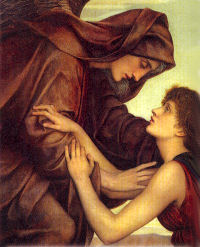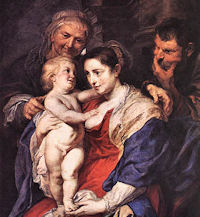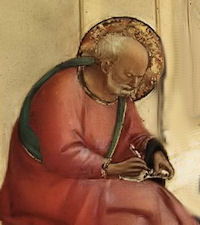
Daily Readings for:November 05, 2013
(Readings on USCCB website)
Collect: Almighty and merciful God, by whose gift your faithful offer you right and praiseworthy service, grant, we pray, that we may hasten without stumbling to receive the things you have promised. Through our Lord Jesus Christ, your Son, who lives and reigns with you in the unity of the Holy Spirit, one God, for ever and ever.
RECIPES
ACTIVITIES
o Practical Suggestions for Christian Living (Anointing of the Sick)
o Praying for the Dead and Gaining Indulgences During November
o Religion in the Home for Elementary School: November
o Religion in the Home for Preschool: November
PRAYERS
o November Devotion: The Holy Souls in Purgatory
o Little Litany of the Holy Souls
· Ordinary Time: November 5th
· Tuesday of the Thirty-First Week of Ordinary Time
Old Calendar: Feast of the Holy Relics Preserved in the Churches of the Diocese; Sts. Zachary & Elizabeth (Hist)
According to the 1962 Missal of Bl. John XXIII the Extraordinary Form of the Roman Rite, today is the feast of the Holy Relics Preserved in the Churches of the Diocese. It is also historically the feast of Sts. Zachary & Elizabeth, the parents of St. John the Baptist.
Since we are so closely associated with the Church Suffering in the communion of saints, fraternal charity demands that we pray fervently for those who have preceded us with the sign of faith and who rest in the sleep of peace. This thought is repeatedly inculcated in every Mass for the dead.
Don't forget to pray for the Poor Souls in Purgatory from November 1 to the 8th.
Feast of the Holy Relics
By relics of the Saints we mean all that remains of them after their death — their bones, their ashes, their clothing and other objects used by them. Enemies of the Church have condemned the cult of the relics of the Saints as being borrowed from pagan customs and without apostolic origin. The decision of the Council of Trent suffices to show the falsehood and bad faith of their reasoning. That Council, in effect, decreed quite otherwise, that the bodies of the martyrs and other Saints, who were the living members of Jesus Christ and the temples of the Holy Spirit, must be honored by the faithful, and that through them God grants a great many benefits to the living. Its decision was based on the usage already established in the first century and which has remained constant in the Church, as well as on the teaching of the Fathers and Councils.
The cult of holy relics is therefore not only permitted, but commanded; it is not only a right, but a duty. Let us note well that the cult of holy relics diverges from pagan practices in that it is supernatural. We do not honor what remains of the Saints for any motive derived from nature, but from motives based on the Faith. If one honors the memory and remains of great men worthy of that appellation, it is regarded as justice; but when one honors the memory and remains of the Saints, it is more than justice, it is the virtue of religion. The final object of the cult of the holy relics is God who sanctifies the Saints; it is Jesus Christ, whose members the Saints are. This cult is so legitimate that God Himself sometimes glorifies the relics of His Saints by heavenly perfumes, by other marvelous privileges, by countless miracles. Let us add that the cult of holy relics also has its foundation in the glorious resurrection which is awaiting the bodies of the Saints. God Himself will reassemble these remains at the end of the world and will give them all the brilliance and beauty of which they are capable.
Let us then venerate, with respect, devotion and confidence, these precious relics which once were animated by such great souls, were the instruments of beautiful and holy works and of astonishing virtues, and which will some day be honored by a brilliant and immortal glory. Let us value pilgrimages made to the tombs of the Saints, and celebrate religiously the feast of the holy relics, which appropriately follows closely upon All Saints Day, the feast day of the splendid holy souls who are in heaven.
—Excerpted from Vie des Saints pour tous les jours de l’année, by Abbé L. Jaud (Mame: Tours, 1950)
St. Elizabeth
The name Elizabeth, which has been borne by several saints, means in Hebrew "worshiper of God." All that we know of Elizabeth, wife of Zachary and mother of John the Baptist, is to be found in the book of Luke. A descendant of the priestly line of Aaron, she was a kinswoman–how close we are not told–of the Virgin Mary.
According to the Gospel, Elizabeth had lived a blameless life with her husband in one of the hill-towns of Judea. Having reached an advanced age with her prayers for a son unanswered, she thought that her barrenness was a reproach. One day, while Zachary was serving in the temple, the Angel Gabriel appeared at the right of the altar, and announced that a son would be born to Elizabeth. It was in the sixth month of her pregnancy that the Virgin Mary came to visit her–a touching and beautiful scene pictured by many great artists.
The Angel Gabriel, having lately announced to Mary the destiny that awaited her, also told her that her kinswoman Elizabeth was with child. The Virgin Mary, eager to share in Elizabeth's happiness and to confide that she too would bear a child, traveled down the dusty road from Nazareth. On Mary's arrival, she was amazed when Elizabeth, having foreseen knowledge, greeted her as "mother of my Lord." Elizabeth's salutation was in these words: "Blessed art thou among women and blessed is the fruit of thy womb. And how have I deserved that the mother of my Lord should come to me? For behold, the moment that the sound of thy greeting came to my ears, the babe in my womb leapt for joy. And blessed is she who has believed, because the things promised her by the Lord shall be accomplished."
The Gospel story tells us further that at Elizabeth's delivery her friends and neighbors rejoiced with her, and when the child was brought to be circumcised, they were going to call him after his father Zachary, but his mother said, "His name shall be John."
—Excerpted from Lives of Saints, Published by John J. Crawley & Co., Inc.
St. Zachary
St. Zachary, whose feast is celebrated on the same day as that of St. Elizabeth, his wife, was of the tribe of Abia, and a member of the priestly class. It was customary for the priests whose week it was to serve in the temple to cast lots each day for the performance of the various rituals. One day, during Zachary's period of service, the privilege of offering incense on the altar in the holy place fell to him, and while he was alone before the altar performing this rite, the Angel Gabriel appeared to him, standing at the right of the altar. Zachary was troubled and afraid. Then Gabriel spoke, saying that the prayers of the priest and his wife would be answered; a son was to be born to them, and his name was to be John. Zachary found this hard to believe, for both he and Elizabeth were advanced in years. Overcoming his fear, he asked the angel for some sign. Because he doubted, the angel announced that Zachary would be stricken dumb and would regain the power of speech only when the prophecy was fulfilled. Then the angel disappeared and Zachary came forth from the temple. The people saw that he was unable to speak and they knew then that he had received a vision from the Lord.
Elizabeth conceived and gave birth to the one who was to be the Precursor of the Lord. After eight days, when the child was about to be circumcised, Elizabeth told the people that he was to be named John; and Zachary, still unable to speak, asked for a tablet, and on it he wrote the words, "John is his name." At this moment Zachary's tongue was loosed, and he began to praise the Lord. The New Testament tells us nothing further concerning St. Zachary. In Hebrew his name means "Jehovah hath remembered."
—Excerpted from Lives of Saints, Published by John J. Crawley & Co., Inc.
The Meaning of Suffrage
The just encounter God in death. He calls them to himself so as to share eternal life with them. No one, however, can be received into God's friendship and intimacy without having been purified of the consequences of personal sin. "The Church gives the name Purgatory to this final purification of the elect, which is entirely different from the punishment of the damned. The Church formulated her doctrine of faith on Purgatory especially at the Councils of Florence and Trent".
Hence derives the pious custom of suffrage for the souls of the faithful departed, which is an urgent supplication of God to have mercy on the souls of the dead, to purify them by the fire of His charity, and to bring them to His kingdom of light and life. This suffrage is a cultic expression of faith in the communion of saints. Indeed, "the Church in its pilgrim members, from the very earliest days of the Christian religion, has honoured with great respect the memory of the dead; and 'because it is a holy and a wholesome thought to pray for the dead that they may be loosed from their sins' (2 Mac 12, 46) she offers her suffrages for them." These consist, primarily, in the celebration of the holy sacrifice of the Eucharist, and in other pious exercises, such as prayers for the dead, alms deeds, works of mercy, and the application of indulgences to the souls of the faithful departed.
— Directory on Popular Piety and the Liturgy
Indulgences for All Souls Week
An indulgence, applicable only to the Souls in Purgatory, is granted to the faithful, who devoutly visit a cemetery and pray, even if only mentally, for the departed. The indulgence is plenary each day from the first to the eighth of November; on other days of the year it is partial.
A plenary indulgence, applicable only to the Souls in Purgatory, is granted to the faithful, who on the day dedicated to the Commemoration of All the Faithful Departed [November 2 {as well as on the Sunday preceding or following, and on All Saints' Day}] piously visit a church. In visiting the church it is required that one Our Father and the Creed be recited.
To acquire a plenary indulgence it is necessary also to fulfill the following three conditions: sacramental Confession, Eucharistic communion, and prayer for the intention of the Holy Father. The three conditions may be fulfilled several days before or after the performance of the visit; it is, however, fitting that communion be received and the prayer for the intention of the Holy Father be said on the same day as the visit.
The condition of praying for the intention of the Holy Father is fully satisfied by reciting one Our Father and one Hail Mary. A plenary indulgence can be acquired only once in the course of the day.